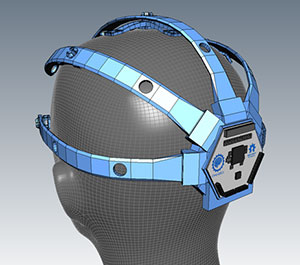The phrase “we want to lower the barrier of entry for brain-computer interfaces” may be the strongest indicator yet that you are, indeed, living in the future. In order to achieve that futuristic dream, Conor Russomanno and Joel Murphy have launched what’s become the infomercial of the 21st Century, a Kickstarter campaign. It’s called OpenBCI and it’s an open-source, 3D printable brain scanner.

With eight days to go, at the time of this writing, OpenBCI has already exceeded its $100,000 Kickstarter goal by about $23,000, indicating that there is a demand for open source brain scanning in the market. Strange as this might sound to grandma and grandpa, such a tool has a number of purposes. $300 OpenBCI board can give Makers the ability to design brain-controlled visualisers. For more advanced users, such hardware makes it possible to create apps, video games and robots that will respond to your EEG signals. Biohackers suffering from anxiety, depression or other diagnoses found in the DSM will love the chance to hone their biofeedback skills. There are other brain-computer interfaces out there, but because OpenBCI is open, what you can do with the hardware is limited to the extent of your imagination and programming skills.
I’m excited by the prospects of an open source brain-computer interface and the guys at OpenBCI seem nice enough. My only hesitation is that the project was originally funded by DARPA, the research arm of the US Department of Defense. I’m all about brain scanning, but, after seeing what the US government can do with my non-neural data, I’m a little nervous about what they’d do if they could scan my brain.



